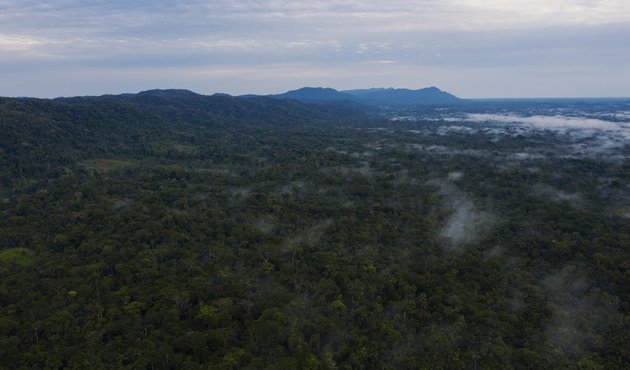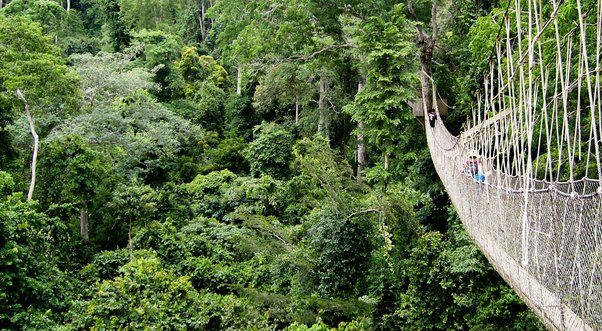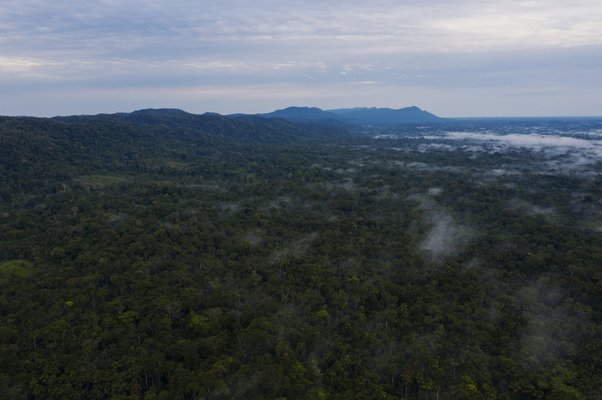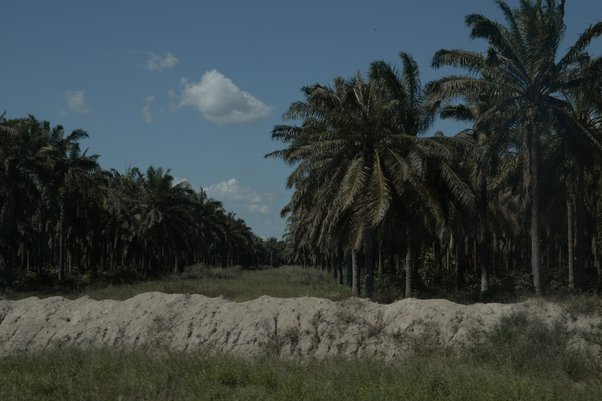The production of commodities like palm oil, soy, rubber, beef, and leather drove the loss of some 12.2 million hectares of forest cover in 2020, according to Global Forest Watch. More than a third of this forest loss - 4.2 million hectares, or an area the size of the Netherlands - occurred within humid tropical primary forests, which are hotspots for biodiversity, home to Indigenous communities and vital in halting climate breakdown.
The EU is a key market for these products linked to deforestation, but it is also home to big banks that are helping finance destructive agribusiness companies responsible for deforestation and associated human rights abuses.
Our new report – Deforestation Dividends: how global banks profit from rainforest destruction and human rights abuses – shows just how much revenue banks are making behind the destruction of world’s forests.
The report reveals that banks and investors based in the EU, UK, US, and China have invested €138 billion[1] ($157 billion) into firms accused of destroying tropical forest in Brazil, Southeast Asia and Africa since the Paris Climate Agreement.
In 2019, we exposed how renowned EU-based banks, such as Santander and Deutsche Bank, had funnelled a staggering €7 billion between 2013 and 2019 to six of the most harmful agribusinesses groups involved in deforestation in the world’s three largest tropical rainforests in the Amazon, Congo Basin and Papua New Guinea.
Now, we’ve gone even further to expose the true scale of the EU financial sector’s bankrolling of deforestation and reveal, for the first time, just how much money EU banks are making off the back of their investments in destructive agribusinesses.
Putting a number on the EU financial sector’s deforestation-linked revenues
Without the lifeline provided by financiers from around the world, including in the EU, harmful agribusinesses would not be able to cut down swathes of rainforests to convert them into cattle ranches or plantations, nor would commodity traders be able to buy these deforestation-linked products and sell them to European supermarkets.
The report analysed more than 70,000 deals struck between 20 agribusinesses[2] and financiers headquartered in the EU, UK, US and China between 2016 and 2020 – showing that banks and investors have made an estimated €1.53 billion[3] ($1.74 billion) in income from huge investments in agribusiness firms linked to the destruction of climate-critical forests.
EU banks and investors are a key part of this problem
Our report reveals that, between 2016 and 2020:
- Lenders and investors based in the EU have generated an estimated €401 million in deforestation-adjusted revenues from €30.6 billion worth of deals with 20 agribusinesses accused of deforestation
- Deal-making among EU banks was dominated by big names from the Netherlands, France, Spain, Germany, and Italy.
EU banks’ hypocrisy on deforestation
At the heart of the problem is a failure of voluntary policies and commitments by the financial sector and a lack of accountability. This means banks can make problematic deals over and over again and face no consequences.
As long as banks are left to police themselves on deforestation with no external accountability it will remain impossible for consumers, customers or communities to know what banks are doing in practice.
In numbers, our investigation reveals that:
- France’s largest bank, BNP Paribas, could have generated an estimated €32.9 million in income from deforestation-risk agribusiness.
When contacted by Global Witness, BNP Paribas said: “We can only regret and deny the assumption ... that BNP Paribas would profit from financing activities that destroy the world’s rainforests.”
It said it only provides financial products or services to agribusinesses having a strategy towards zero deforestation in their production and supply chains by 2025.
- Dutch bank Rabobank could have generated an estimated €67.2 million
When contacted by Global Witness, Rabobank said it was “not willing to finance deforestation or land grabs” and had put policies in place to this end.
The bank added that it favours “an engagement approach towards those companies which are our current clients in order to effectively address any [environmental or social] concerns,” although it has exited some relationships when progress was not satisfactory.
- Deutsche Bank, Germany’s largest lender, could have made €12.4 million.
The bank declined to comment on this report when contacted by Global Witness.
It has said it will not finance the destruction of primary forest, High Conservation Value or peatlands, illegal logging, and uncontrolled or illegal use of fire where there is clear and known evidence of any of these harms taking place.
What can the EU do?
The European Union has a unique opportunity to put its own house in order and end its complicity in global deforestation with legislation under development that will regulate forest-risk commodities coming into the EU market.
But in order for the law to be effective and ambitious – and meet the demands of the EU’s Paris Climate commitments and the European Green Deal – it is crucial that the financial sector is not let off the hook.
This means that the legislation should also require EU financial institutions to check whether they are backing companies involved in global deforestation, and to mitigate their exposure to such risk.
Existing initiatives on finance and sustainability are not designed to stop deforestation finance.
The EU Action Plan on financing sustainable growth (Taxonomy)[4] only covers green finance products – so doesn’t cover the mainstream financing most often linked to deforestation.
Similarly, the EU Corporate Sustainability Reporting Directive (CSRD) does not require financial institutions to undertake adequate checks in their financing decisions and does not include provisions that would prevent financial institutions from funding harmful activities.
Relying only on disclosure of companies’ activities – which often overlook their role in deforestation – does not necessarily lead to banks stopping profiting from deforestation and human rights violations.
Whilst banks and investors can keep the profits made from dealing with companies implicated in deforestation with few or no consequences, they will continue bankrolling destructive agribusinesses.
Only by ensuring financiers are held accountable through legislation will we end their complicity in the destruction of the world’s forests and related human rights violations.
The EU can do this by including the financial sector in its upcoming regulation on deforestation and should seize the opportunity to safeguard the future of the world’s forests.
[1] Exchange rate used: 0.881741383069989 for USD to EUR conversions.
[2] Brookfield Asset Management; Cargill; COFCO; Felda Group; Genting Group; Itochu; Jardine Matheson Group; JBS; Marfrig; Minerva; Noble Group; IOI Group; Oji Group; Royal Golden Eagle Group; Salim Group; Sinar Mas Group; Sinochem; SLC Agricola; Olam International; Wilmar
[3] Exchange rate used: 0.881741383069989 for USD to EUR conversions.
[4] European Commission, EU taxonomy for sustainable activities. Available at: https://ec.europa.eu/info/business-economy-euro/banking-and-finance/sustainable-finance/eu-taxonomy-sustainable-activities_en
Methodology note: Estimates of revenues from deals have all been adjusted downwards to account for the proportion of each agribusiness thought to directly participate in a forest-risk commodity. It should be noted that banks and asset managers often hold bonds and shares on behalf of third-party investors, as well as on their own behalf. The bank or asset manager will normally gain from the transaction taking place, earning a percentage of the invested value or a fee. But not all of the income will be retained by the bank.



